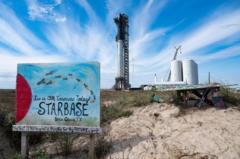Elon Musk's SpaceX facility in southern Texas has officially transformed its operational base into a municipality called Starbase, following a recent vote. The election, held on Saturday, garnered the support of 212 out of 283 eligible voters, primarily comprising SpaceX employees. After the results were posted online by Cameron County, Musk celebrated the decision with a message on his social media platform X, announcing, "Starbase, Texas is now a real city!"
Covering roughly 1.6 square miles, the area was minimally populated prior to SpaceX’s land acquisitions beginning in 2012. The newly established city will adopt a government structure featuring a mayor and two commissioners responsible for local governance, including planning and tax regulation. However, the incorporation has faced opposition from residents concerned about the environmental impacts purportedly caused by SpaceX activities.
Since SpaceX commenced operations, the company has built housing and additional facilities in the area, with Musk reportedly residing locally. Starbase features notable landmarks, including Memes Street and a large bust of Musk, which recently suffered vandalism.
The first mayor of Starbase will be Bobby Peden, a SpaceX vice-president who ran unopposed, along with two other SpaceX-associated residents filling the commissioner roles. Starbase will be classified as a Type C city, allowing it to impose a property tax of up to 1.5%.
Legislation navigating through the Texas state legislature could grant Starbase the authority to close highways and limit access to Boca Chica Beach during SpaceX-related activities. Currently, closures are managed by Cameron County, which also oversees nearby Brownsville and South Padre Island. Some officials, like Cameron County Judge Eddie Trevino Jr., oppose the bill, as it may ignite conflicts regarding beach access amid plans to escalate rocket launches from five to 25 annually.
Elon Musk has shifted several business operations and his corporate headquarters from California to Texas, citing regulatory advantages and political differences. His companies X and Boring now operate near Bastrop, albeit without significant housing development for employees, who mostly reside in surrounding areas.
Concerns have been raised by environmental groups regarding the ecological impact of SpaceX's operations, highlighted by increased light pollution and debris from launches. In 2024, the company faced a nearly $150,000 fine from the U.S. Environmental Protection Agency for wastewater violations, which SpaceX described as misunderstandings involving paperwork.
Covering roughly 1.6 square miles, the area was minimally populated prior to SpaceX’s land acquisitions beginning in 2012. The newly established city will adopt a government structure featuring a mayor and two commissioners responsible for local governance, including planning and tax regulation. However, the incorporation has faced opposition from residents concerned about the environmental impacts purportedly caused by SpaceX activities.
Since SpaceX commenced operations, the company has built housing and additional facilities in the area, with Musk reportedly residing locally. Starbase features notable landmarks, including Memes Street and a large bust of Musk, which recently suffered vandalism.
The first mayor of Starbase will be Bobby Peden, a SpaceX vice-president who ran unopposed, along with two other SpaceX-associated residents filling the commissioner roles. Starbase will be classified as a Type C city, allowing it to impose a property tax of up to 1.5%.
Legislation navigating through the Texas state legislature could grant Starbase the authority to close highways and limit access to Boca Chica Beach during SpaceX-related activities. Currently, closures are managed by Cameron County, which also oversees nearby Brownsville and South Padre Island. Some officials, like Cameron County Judge Eddie Trevino Jr., oppose the bill, as it may ignite conflicts regarding beach access amid plans to escalate rocket launches from five to 25 annually.
Elon Musk has shifted several business operations and his corporate headquarters from California to Texas, citing regulatory advantages and political differences. His companies X and Boring now operate near Bastrop, albeit without significant housing development for employees, who mostly reside in surrounding areas.
Concerns have been raised by environmental groups regarding the ecological impact of SpaceX's operations, highlighted by increased light pollution and debris from launches. In 2024, the company faced a nearly $150,000 fine from the U.S. Environmental Protection Agency for wastewater violations, which SpaceX described as misunderstandings involving paperwork.



















